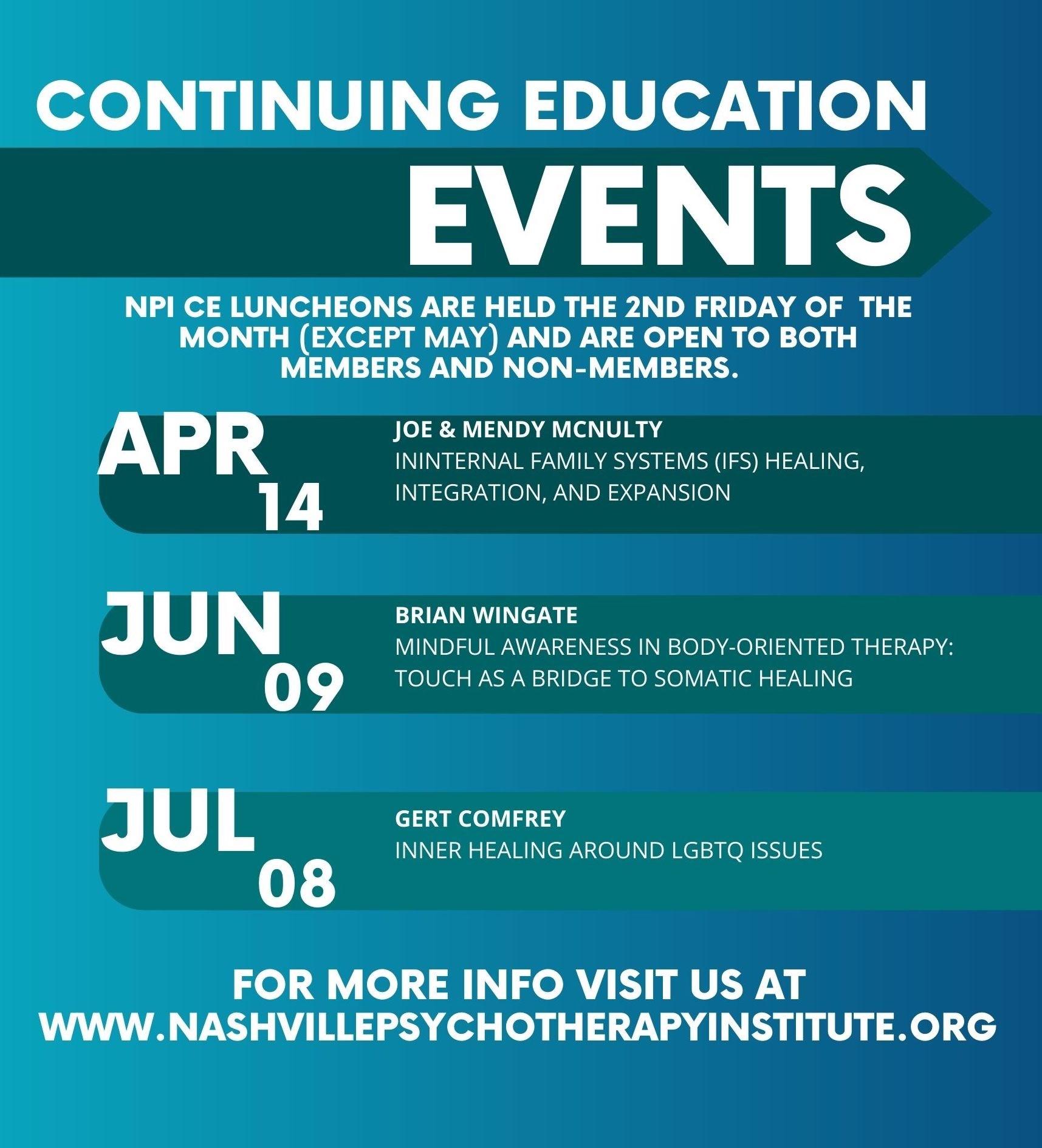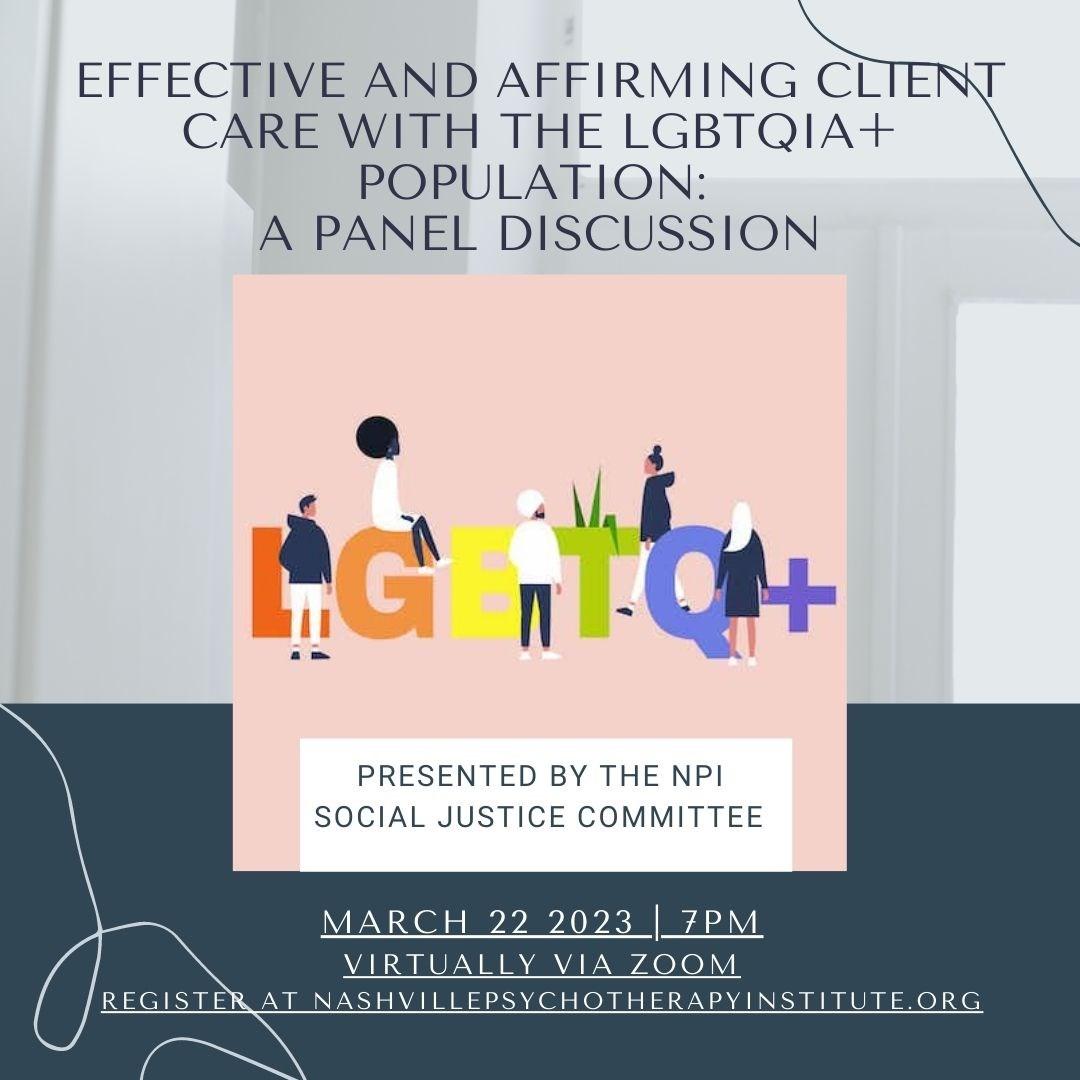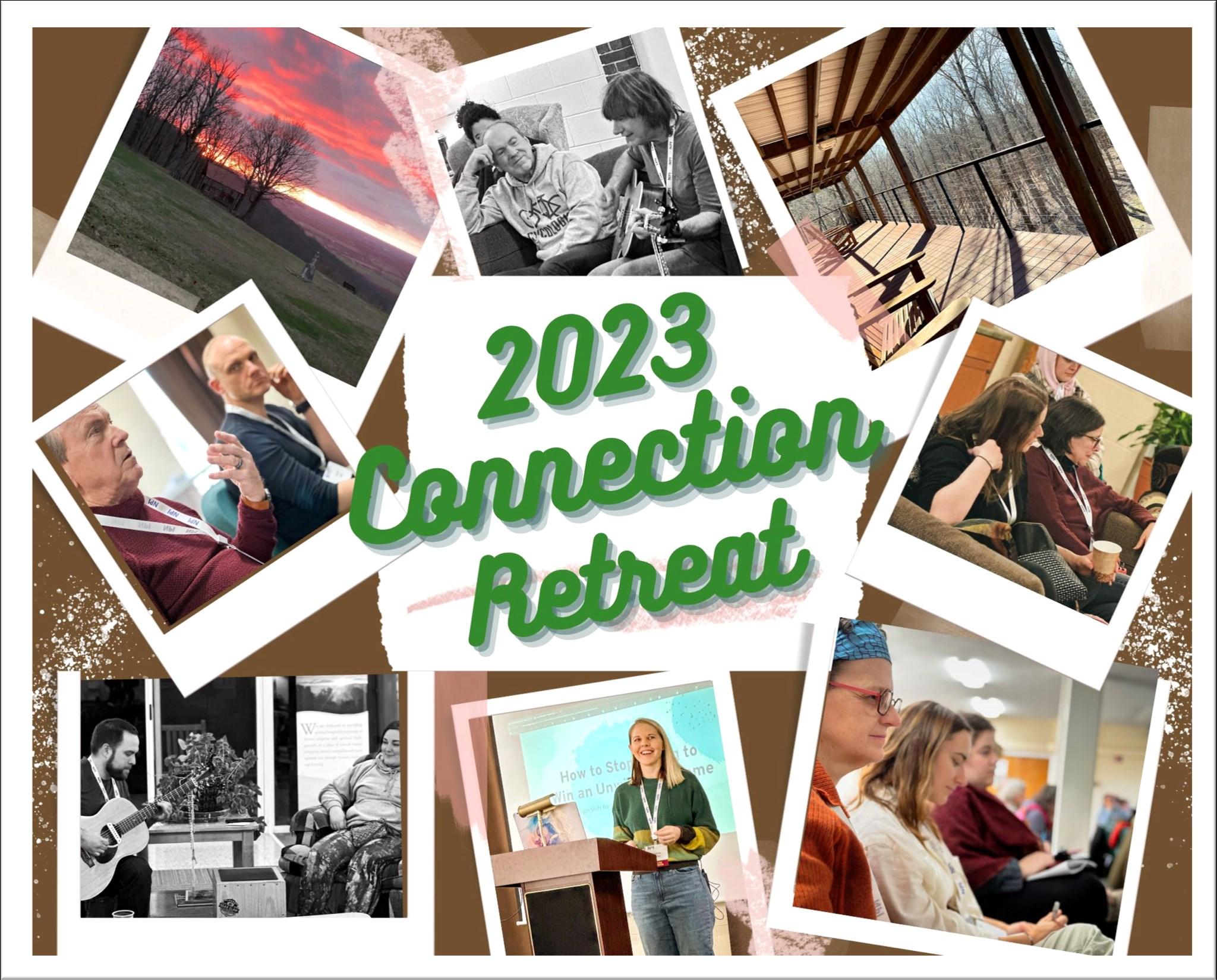Volume 13: Issue 1
Opening to Our Inner Healing Intelligence

Join us in 2023 as we continue to explore the internal wisdom that encourages the human psyche to move in the direction of healing, wholeness, well-being, and growth.
“Collective sigh,” group of people pausing under a sunset (Photo by Arthur Poulin @barchpou)

NPI strives to cultivate respect within our community for people of all abilities, ages, countries of origin, ethnicities, genders, gender expressions, races, religions, and sexual orientations. Visit Page 4 to learn more about NPI’s Social Justice Committee

1
2023 What is NPI? The Nashville Psychotherapy Institute is a 501(c)(6) non profit, professional organization. Founded in 1985, NPI now boasts 340+ members. Inside this issue: A note from the Chair Tom Neilson 2 Closet of conformity Tonya Mills 3 NPI Social Justice Committee Info 4 Continuing Education Opportunities CE Meetings & Social Justice Event 5 The birth of IMPACT Linda Manning & Cathy Yarbrough 6 Incorporating nature into everyday... Sandra Durham 7 Goddesses, Gods, and Humans Barbara Sanders 8 Don’t take things so seriously John Marshall 9 Old Linda Odom 10 Board Member Spotlight Valerie Martin 11 My trip t o paradise... Philip Chanin 13 Love on the ropes... Philip Chanin 14
NPI REFLECTS SPRING
From the Chair...
Spring appears to be arriving early this year, with unseasonably warm and beautiful weather, and it is accompanied by many positive developments in NPI. Luncheons have moved from virtual to hybrid and now to fully in-person again, as we continue to recover from the pandemic. Our first two meetings this year were at Wildheart Meditation Center in East Nashville, and they included excellent presentations by Amy Price-Neff, MD (“Befriending the Inner Healer in the Medical Setting”) and Adrianne McKeon, Ph.D. (“An Exploration of How a Client’s Hispanic Identity Informs Clinical Work”). Dr. Neff’s presentation demonstrated how physicians of all specialties can be open, collaborative, and humanistic, and how important the “Inner Healer” is in medicine. Dr. McKeon’s talk was, in my opinion, the most moving and useful presentation on cultural diversity that I have ever seen. It was also one of the most interesting talks I’ve attended in quite a while. Attendance of both talks was excellent; we filled the venue each time.
Tom Neilso, Psy.D

The NPI Connections Retreat at St. Mary’s Sewanee on February 18-19, “Reconnecting with Ourselves and Nature,” was a resounding success. The retreat was completely sold out and quite lively. St. Mary’s campus was beautiful, as always. Members really seemed to enjoy the educational opportunities and the time to spend together reconnecting. The NPI Board ran in to a significant challenge the day before the retreat, however. Our keynote speaker, Kendra Delaney, Ph.D., had to cancel due to illness. She was due to be the first speaker of the retreat. Fortunately, Valerie Martin, the keynote speaker for Sunday, agreed to do her talk a day early. Valerie presented a fascinating talk, “How to Stop Trying to Win an Unwinnable Game: A Paradigm Shift for Healing Overwhelm and Disconnection” to open the retreat and keep it on track. Thank you, Valerie for bravely stepping up! During Saturday afternoon, breakout presentations included “Making Positive Connections Through Healthy Sexual Behavior” by Ashley Smart Fleming, LPC, “Joyful Movement for All Bodies” by Colleen Werner, LPC, “Reawaken Your True Nature and Rewild Your Busy Life” by Musenge Luchembe Hayslett, LPC, and “An Ounce of Behavior is Worth a Pound of Words: Using Acting Training to Teach Counselors” by Elizabeth A. Baum. There was also an opportunity for Guided Vinyasa Yoga with Matt Reid, MS, to take a guided hike, and time for doing puzzles and games together. On Sunday morning, Jamie Kyne, Ph.D. and I presented an impromptu workshop titled, “Poetry as Magic, Poetry as Therapy: Reconnecting with Ourselves, Others and Nature,” filling the spot that Valerie Martin was originally slated for. I would like to offer thanks and a deep bow to my friend, Jamie Kyne, for agreeing to step in and co-present with little time and preparation at a retreat he was not originally planning on attending. In helping NPI out, Jamie went well above the call of duty, and I am privileged to call him “friend.” I enjoyed doing the presentation with Jamie, and judging by the audience participation, it was well-received. Thank you to everyone who helped make the retreat a success.
I am excited to announce NPI’s Fall Workshop, which will be on Saturday, October 21, 2023. Mary Cosimano, LMSW, the Director of Guide/Facilitator Services for the Johns Hopkins psilocybin research, will present “The Healing Presence of the Psychedelic Therapist.” We are very fortunate to have such a distinguished, nationally known expert present for NPI (and thank you to Sonya Thomas, LCSW for her help in recruiting Mary). This will be a deep and meaningful presentation on cutting-edge psychotherapy innovations. Please watch this space for more information.
While many wonderful things are going on in NPI, I’m afraid I can’t speak so enthusiastically about some legislative developments across the country and in Tennessee. I am writing specifically about various bills in Tennessee and other parts of the South that are aimed at criminalizing free speech and expression for the LGBTQ+ community and criminalizing appropriate and necessary gay and trans-affirming medical and mental health care. Some of these bills will put our values and professional ethics at odds with state laws, which puts therapists in a difficult position - but not nearly as difficult as the position they will put some of our clients in. The NPI Social Justice committee, headed by Valerie Martin and Linda Manning, has put together a valuable presentation on the subject, to be held on Zoom from 7-8:30 pm on March 22. “Effective and Affirming Client Care with the LGBTQ+ Population” will be a panel discussion featuring Gert Comfrey, Dani Neiderhiser, Amalie Ruckman, and Colleen O’Connell. This gathering will discuss ways to support and attend to our LGBTQ+ clients in the wake of recent legislation. Attendees will learn how to best hold space with this population. We hope to see you there!

2
CLOSET OF CONFORMITY
by Tonya Mills, LPC-MHSP
Each year, Tennessee is one of the first states to introduce the highest number of anti-LGBTQIA+ legislation. 2023 has been no exception, with the primary focus being on preventing minors from gaining access to genderaffirming care and gender expression. For this article however, I will be focusing on one piece of legislation that has the potential for much broader implications.
SB 0003, known as the “anti-drag bill” creates an offense for any person who engages in “adult cabaret entertainment” (also defined as “adult-oriented performances”) on public property or in any location where the entertainment could be viewed by someone who is not an adult, and when the performances may be harmful to minors as defined under present law (whether single or multiple performances, paid or unpaid). “Male or female impersonators” is included in the definition of “adult cabaret”. The first offense will be a Class A misdemeanor, and every violation thereafter, a Class E felony. A link to the full bill summary is provided at the end of this article.
Nashville’s Gay Pride celebration and parades have been held in public parks and on city streets annually since 1988 (with the exception of 2020), and usually have drag performers in attendance. Should this bill become law, for the first time these performers will be subject to criminal charges as “male/female impersonators”. This law will also presumably prohibit drag shows from taking place in popular establishments (bars, cafes, music venues) where minors may be present (no more “drag brunches”). Drag, which rarely involves stripping or nudity, often incorporates comedy, and is a form of artistic and gender expression to the performer. This bill’s target to drag performers and Gay Pride celebrations is obvious.
What is less obvious and one of the more troubling aspects of this bill however, is the threat it poses to one of the most vulnerable subsets of the LGBTQIA+ population - our transgender and non-binary clients (which may or may not include drag performers). The use of broad terms like “male and female impersonators”, “harmful to minors”, and the general lack of guidance that’s been given on how and to what extent this law will be enforced, leaves them open to discrimination from law enforcement and prosecutors, and at the mercy of their interpretations. The message this bill sends to these clients is “get back in the closet you don’t belong you are not seen”. Many of them to varying degrees, will hear and feel this message as not only coming from the State of Tennessee, but from every negative, judgmental, and punitive voice in their past, ranging from all or some of: parents, family, classmates, coworkers, church, friends, employers, etc.
So how are we to do good clinical work, when the laws of our country tell our clients that they must remain behind closed doors, in their homes, or in the darkest of corners? I believe we must stay steadfast in our current course of providing a safe and accepting space and container for exploration of true self, but also reiterate that it’s more important than ever to find community and allies that can offer physical, emotional, mental, and general safety and support. Beyond this, I will share some common concerns and effective work done in treatment with my clients who identify as transgender and non-binary (understanding that this list is not exhaustive - each client’s experience/journey is of course unique, and so too will be therapy).
The discovery of gender identity is a journey of exploration that often includes little to no guidance and support, and may begin alone and in hiding, with gender dysphoria and shame, and can lead to bullying, abandonment, depression, anger, addiction, trauma, bodily dissociation, and suicidal ideation. It always involves the usually stressful “coming-out” process (sometimes in the therapy room). In my experience, it is absolutely essential that transgender and non-binary clients in particular feel seen in therapy. These clients often have someone other than who they are mirrored back to them in childhood. They also have a tendency to grow up not seeing themselves in the world around them. Part of connecting with self, is being able to look in the mirror and feel like you “see you”. It can be very distressing when they look at a reflection of themselves and see a person with a gender other than their own. I once asked a client who identified as transgender, what it felt like when he looked at himself in the mirror dressed as a woman. He responded “it feels like I’m home”. Because disconnect or dissociation from their bodies is not uncommon, I have found careful exploration of where they feel comfort and discomfort, as well as how they interpret and relate to their body can provide some relief to the dysphoria and shame.
3
(Continued on page 4)
(Conformity, continued from page 3)
Being able to live in the world with an external appearance that aligns with gender identity, even if just for a brief while (to go to the grocery store, to meet friends at a café), can be a freeing and healing experience for our them, and almost always provides a relief from symptoms. The threat of this being taken away by SB 0003 may mean the re-opening of old wounds, fears, and symptoms (including suicidal ideation) that we will need to help them work through. Unfortunately, some transgender and non-binary clients don’t have the support and safe community that others do. Isolation can already be prevalent, and many will isolate more or go back into the closet (living fully binary or incongruent with their gender identity), after realizing that they are now at an even greater risk of losing their jobs, family, friends, etc. Finally, while we of course encourage and empower our clients to decide for themselves, how they want to respond to these attacks, staying educated and informed about the ever-changing legislation in Tennessee and local resources available is essential in working with such a vulnerable group. I’ve provided a few links below.
To close, if interpreting SB 0003 literally, anyone who dresses in a less gender conforming way is at risk should this bill pass (regardless of gender identity or sexual orientation), particularly if their behavior in public or around minors is interpreted by law enforcement or prosecutors as “a performance that represents sexual excitement or conduct and is offensive to prevailing standards to what is suitable for minors” (SB 0003, 2023). Will more gender non-conforming music artists like Jake Wesley Rogers be charged with a misdemeanor after performing in Nashville? Will Nashville Shakespeare festival, held at Centennial Park, be unable to perform any traditional versions of Shakespeare plays? When will it end?
Tennessee Equality Project (TEP): https://www.tnep.org
Human Rights Campaign (HRC): https://www.hrc.org/resources/glossary-of-terms
Vanderbilt’s Program for LGBTQ Health (including Clinic for Transgender Health): https:// www.vanderbilthealth.com/program/program-lgbtq-health
SB 0003, 113th Gen. Assembly. (TN 2023). https://wapp.capitol.tn.gov/apps/BillInfo/Default.aspx?
BillNumber=SB0003

*Since the writing of this article, SB003 has been signed into law by Governor Bill Lee. The sources listed in this article continue to monitor all legislation relative to LGBTQ issues, as well as provide updated resources and support.
NPI Social Justice Committee (continued from page 1)
NPI was founded to provide a forum for continuing education for licensed mental health clinicians and an opportunity to experience community with one another and encourage one another in all aspects relevant to our common scope of practice. The Social Justice Committee supports these goals of NPI. We do this with events we create and host, as well as by providing resources and information about events sponsored by other organizations in Middle Tennessee.
As a part of our commitment to promoting Social Justice, NPI’s Social Justice page: https://nashvillepsychotherapyinstitute.org/social-justice/ and the new Diversity, Equity and Inclusion page: https://nashvillepsychotherapyinstitute.org/social-justice/ on the NPI website provide education and advocacy resources. The Social Justice page describes our mission and invites participation and suggestions by any interested NPI member. The Diversity, Equity and Inclusion page acknowledges the national moment of reckoning related to race and its intersectionality with gender, class, and other social locations and identities, and how we as therapists can be involved in this movement. It includes statements from our professional organizations, professional practice guidelines, and resources for education and action.
We are continuing to add links to assist members in tracking legislative proposals that impact our work as therapists and the people that we serve. Please let us know of any needs or suggestions that you have for the work of this Committee by contacting Linda Manning at doclgm70@gmail.com or Valerie Martin at valerie@gaiacenter.co.
4
Event open to members and non-members!








the Interdisciplinary Mental Health Professional Association Coalition of
Tennessee
By Cathy Yarbrough and Linda Manning
The seeds of a coalition for mental health provider associations were planted in 2020, at the start of the pandemic. Cathy Yarbrough, as Chair of the Board of NPI came together with other professional association leaders to facilitate a way for providers to offer pro bono therapy to health care workers. That led to the incorporation of the non-profit, the Mental Health Active Response Team. Cathy volunteered to be the non-profit’s liaison to the various mental health provider associations in the effort to recruit volunteers.
It occurred to her that if the associations were willing to come together in this endeavor, perhaps they could be brought together on a more permanent basis. She envisioned a statewide organization that functioned very much like NPI - one where professionals from different disciplines could work together to address common concerns, such as advising the Tennessee General Assembly on relevant legislation, providing world class continuing education to Tennessee therapists, and hosting a multidisciplinary conference. The idea of forming a coalition percolated in the background throughout 2020, as Cathy served on the boards of both NPI and MHART. She set a virtual meeting date in early 2021 and invited association leadership.
On March 19, 2021, Cathy, MHART Liaison and NPI Past Board Chair, and Gina Delgardo, Board Chair of MHART and Past President of TPA, hosted the first informal meeting of the coalition via Zoom. In attendance were Karen Franklin, Executive Director, NASW-TN; Janet Hicks, President, TCA; Robin Lee, Executive Director, TLPCA; Jeanine Powers, Continuing Education Coordinator, KAPA; Eli Reich, President, TN Psychological Association; Mike Runcie, President, TNAMFT; and Jay Tiff, TCA. These association leaders recommitted to supporting MHART’s volunteer recruitment and agreed that they would like to meet again to discuss the parameters of their ongoing collaboration.
The second meeting is when things began to gel. Joining many of the above representatives at the April meeting were Erica Gentry, Coalition of Black Social Workers; Laura Kreiselmaier, President, Tennessee Association of Pastoral Therapists; Linda Manning, Chair-elect, Nashville Psychotherapy Institute; Lisa Oglesby, President, Knoxville Area Psychological Association; Mary Payne, President, Nashville Area Psychological Association and President-elect, TPA; and Nora Williams, Tennessee Psychiatric Association. The group agreed that a primary benefit of a coalition would be learning about pending legislation, as well as the possibility of using the power of working together to advocate for mental health enhancing bills with the Tennessee legislators. Additional benefits mentioned were sharing information about continuing education options, partnering to bring world class educational programs to Tennessee, working together to reduce the stigma of seeking mental health treatment, negotiating psychotherapy rates as a bloc, identifying effective ways to increase availability of behavioral health treatment to underserved populations, and identifying and addressing unrecognized community needs. Rather than creating another 501.C.6 organization, the group wanted to remain informal. The NPI representative and the representatives of the statewide associations would form the basis of a steering committee to decide on the coalition’s organization, function, and direction. Laura Kreiselmaier suggested the name: Interdisciplinary Mental Health Professional Association Coalition of Tennessee (IMPACT). The group met four times in 2021, five times in 2022, and twice so far in 2023. In the meetings, there was much discussion of the inefficiencies in the state licensing boards and exploration of ways to jointly address them. The group also discussed at length various bills before the TN General Assembly, and whether the associations should offer joint or individual comments. There was great concern about how the Dobbs decision would affect therapists. The coalition may, in the future, commission a full legal analysis of this issue. The decision was made to have the various association’s legislative liaisons stay in touch in the current legislative session. Other topics discussed were organizing advocacy training, a behavioral health Day on the Hill, and the racial disparities in professional licensing and biases in testing.
As 2022 ended, the board of MHART realized that with the waning of the pandemic and the launching of the National Mental Health Hotline, their mission was fulfilled. MHART dissolved as of December 31, 2022. MHART’s position as a multidisciplinary organization was a key reason that IMPACT was able to form. No single professional association could be seen as dominating. With the dissolution of MHART, NPI, also a multidisciplinary organization, was the logical successor host. Linda Manning, past NPI Chair, and Cathy Yarbrough will alternate leading the coalition meetings in 2023. Hopefully, NPI will continue in the role of IMPACT facilitation as IMPACT develops and grows.
6 The Birth of IMPACT:
coming home: small ways of incorporating nature into your everyday
 Sandra Durham, MMFT (temp) at Claiming Ground Counseling PLLC
Sandra Durham, MMFT (temp) at Claiming Ground Counseling PLLC
The benefits of spending time in nature are immense. According to various studies highlighted in The Nature Fix by Florence Williams, being in nature supports the parasympathetic nervous system, lowers blood pressure, decreases stress, can ease depression and boosts the immune system. Many of us know this to be true; we feel the peace and balance nature brings when we watch the sunset or see the bright spring blooms on a neighborhood tree. This truth is passed down from our ancestors, a legacy from Indigenous peoples that our industrialized society, grind culture, and attention economy continuously distracts us from. Our day to day responsibilities and tasks often make incorporating nature into our routine really difficult.
But what would it be like to forge a relationship with nature… truly get to know the trees in your neighborhood, the squirrels and birds around your house or the giant Cumberland River that weaves throughout our city and provides water for us each and every day. Maybe this spring is the perfect time to try out this truth our ancestors already knew, that when we connect with nature, we connect more with ourselves and the community around us.
Ideas for how we can bring nature back into our everyday lives:
Use this website to learn more about the people that came before us and use that knowledge to feel more grounded to, and mindful of, the place you live and work Native-Land.ca | Our home on native land
Leave your phone inside and spend 10 minutes in your yard… playing, gardening, sitting and watching the nature in your neighborhood, going on a walk.
Window gaze: set a time for 2-5 minutes and just gaze out a window… Notice what nature you can see and pay attention to your internal experience.
Sensory walks: go on a walk in your neighborhood or at a local park, tune into all your senses on this walk. What do you smell? How many sounds can you hear? What various colors do you see?
Start realizing how alive the more-than-human-world is. On your way to work or during a lunch break, pay attention to how much aliveness is all around you (from the hundred year old trees to the tiny ants on the sidewalks)… Life is all around us thriving and growing - the trick is to start paying attention to it!
Find a nature buddy to connect with - pick one plant close to your house or start with your pet and just notice what it’s like to make more time with that part of nature.
Use these ideas as a springboard to get creative and try various ways you can start to build your relationship with nature. Notice if this kind of connection helps your overall wellbeing and in what ways it might help you show up better as a counselor or in your other various roles. Make space this spring and allow yourself to simply be. Wishing you many small moments of connection with yourself and the natural world going forward!
7
Goddesses, Gods, and Humans
By Barbara Sanders, LCSW https://SacredFreedomCollective.com/
The Celtic Goddess of Spring, dawn and fertility
Brigid was also a goddess of birth, protection
Agriculture, music, and art
Viewed at times as a fighter or a flame
Different cultures, different meanings
Maybe a triple goddess or just one
Myths, creeds, and folklore abound
Who are our goddesses and gods
And are we included in the list?
A goddess protects the land, the skies, and the seas
A goddess treats the sick, heals and comforts the wounded
A goddess brings forth life (and maybe even death?)
She is all knowing, all seeing, all giving Divine
Sounds like the God that I grew up with In a church, omnipresent
Lord of all the heavens, the Earth, the waters and the air
Lord of people and animals
Rocks and minerals
God bless the little children
Surely a god or goddess is Androgynous or Transgender, at least
Not a person at all
So no gender needed
What do I know, wondering and Wandering while I write?
Do humans need
Something or someone to worship?
Or do we just need really
Beautiful and inspiring stories
About heroines and heroes?
Is it human to need to believe
That someone, some entity somewhere Is looking down on us, or up at us
Watching what happens to us
Comforting us when we need it
And sparking us to move forward
When the world needs us?
Some deities are animals or plants
I worship the jaguar, the hawk and the goose

Along with the elephant and the snake
Trees are deities as are the rose and So many other flowers
Some worship objects or Jesus or Mary
A well, a mountain, or a seed
A medicine or a shaman
Or the magic dollar, power, or fame
If we don’t worship and pray to a deity
Then what would we worship
Pray to, get mad at, and seek to know
If our lives are not going our way
Who do we look toward to help us?
Surely we have found out that other Human beings may act like saviors for Awhile, but ultimately they (we)
Let each other down
Just by being human
Some goddess or god must Have made them (us) that way
The Muse is speaking
I am listening
Is She my goddess?
The Great Mysteries remain Let’s keep asking
Questions and Sharing them
8
Don’t Take Things So Seriously?
by John W Marshall LMFT AAMFT Clinical Supervisor johnmarshalltherapy.com
My first year in private practice was 5 years after I graduated with my therapy degree from Fuller Seminary’s School of Psychology. I was desperate for clients now that I was out on my own. As I examined my potential referral sources I remembered that a close friend from grad school now ran the counseling ministry at Focus on the Family. Susan (not her actual name) was in charge of handing out client referrals to Christian counselors in Southern California since it wasn’t possible for them to handle the demand on their own.
So I called up my friend and asked what I needed to get on the referral list. She was excited to hear from me and equally excited to send some overflow clients my way. She said she would send me an application/ questionnaire and we’d be on our way. One of the first questions asked was if I would see gay clients and if so what direction I would give them regarding their lifestyle. Remember now, this was 1986 and Christian therapists were just coming to terms with what it meant to help people coming out of the closet. In other words, how would we reconcile our client centered approach to therapy with our theology that had clearly taught us that living a gay lifestyle was sinful?
I remember desiring to be honest in my response and at the same time not sabotage my chances to receive new clients. I said that although the Bible suggested that sex was to be exclusively between a man and a woman, my brief experience had also taught me that people don’t choose to be gay. Instead, it seemed they wake up to their sexual orientation over time and then were confronted with the difficult question of whether or not to lead a gay lifestyle.
I said that if asked by the client, I would even be willing to explore their desire to become heterosexual. I added however that I hadn’t seen much success with reparative therapy to date. I explained that it wasn’t a therapist’s job under any circumstances to persuade gay people to deny their sexual orientation no matter what my religious beliefs happened to be. I knew I was walking a tight rope but felt optimistic about how I had responded. I then sent my application back to my friend.
I’m embarrassed to admit this, but I was shocked when I received Susan’s form letter back saying that Focus would not be sending me any clients because of my position on homosexuality. My response was not in line with the ministry’s beliefs. I felt insulted and immediately called my friend to ask for an explanation. She explained that Dr. Dobson’s theology regarding most issues was more conservative than mine and perhaps her’s as well. She encouraged me to rewrite my answer and she would then begin sending me referrals. I laughed out loud in disbelief and asked if I had heard her correctly. She told me to not take things so seriously. After all this was how she had learned to navigate the Christian counseling subculture. I never sent in another application and never got any referrals. As I look back on 35 years I’m glad I didn’t cave into my fears of not having enough clients. I’m proud that I didn’t compromise and put myself in a position that could have somehow contributed to the discrimination against LGBT people.
I have seen many LGBT clients in my practice since over the years. Now more than ever I know that a person can’t pray the gay away. The reparative therapy approach has severely damaged countless people. In recent time I have added to my website that I am a LGBTQIA affirming therapist. With the conservative backlash growing in our country I felt it necessary to be clear about where I stood. My practice is in Middle Tennessee where it is still assumed that if you are a person of faith you are also against same sex relationships and a gay lifestyle. I had hoped that all these years later the Evangelical Church would be living in less fear of cultural change. Whether intended or not their reaction has lead to increased discrimination against the LGBT community.
I am likely losing potential clients because of my position. Just as I did when I started my practice. This is a small price for me to pay. I can only hope and pray that in the years ahead gay people will be fully embraced by both Christian and secular culture. I find it very sad that the Church continues to lag behind the culture as a whole as it relates to the advances we have made in our understanding of psychology and specifically sexual orientation. Fear of change can cause any of us to remain blind and deny the truth that is standing right in front of us.
9
By Linda Odom, PhD
When does one become old?
Is it a number?
Is it the way my face appears?

Or my hands?
Or is it how much light I carry
How much light I let in,
How much light I radiate out?
Is it the brightness or dullness of my aura and the vividness of its unique colors?
Is it the amount of energy that flows through me unimpeded ?
Is it the way I touch others and allow them to touch me?
Is it how eagerly I do or don’t greet the new day?
Is it how much joy beauty awakens in me?
Or how much love I breathe in and breathe out?
What exactly is old?
10 OLD
Board Member Spotlight
Valerie Martin, LCSW
Valerie Martin is a multi-passionate LCSW psychotherapist, coach, podcaster, and the founder and clinical director of The Gaia Center for Embodied Healing. She’s also a cat Mom, wife, Enneagram 7, and literal tree-hugger. You can find out more about The Gaia Center at https:// gaiacenter.co/ and about Valerie’s other work at https:// www.valeriekmartin.com/hello. We asked Valerie to tell us a little about herself!

I joined NPI in 2017 as I was transitioning from residential treatment to private practice. As many of you reading know first-hand, that kind of transition can be very daunting. It feels like there are a million things to learn and do, and NPI gave me the opportunity to make connections that were tremendously helpful in that process. I could get support from other folks who’d walked that path before rather than constantly trying to reinvent the wheel, and it provided excellent ways to meet fellow therapists, which would have felt much more intimidating otherwise.

Here are just a few highlights from my time so far with NPI:
The Connections Retreats - Anytime I tell someone about NPI, this is where I start. Not only have I enjoyed the self-care and learning at the retreats, but I have made and developed real, lasting friendships because of them. This year’s retreat was a big highlight since I got to deliver one of the keynote presentations and I’m already looking forward to the 2025 retreat!
Joining the Board - I joined the board in February 2022, and it has been such a great learning experience to get to be a part of the behind-the-scenes process with planning the events and other happenings with NPI. I have a much deeper understanding of the mission of the organization, how it serves our community, and the ways we’re striving to make it better all the time. I highly recommend applying to be on the board at some point.
The Social Justice Committee - I will admit that I did not explore committees prior to being on the board, but in case you don’t know this, you definitely don’t have to be on the board to serve on a committee! Our committees can be flexible with however much or however little time you’re able to give, and it’s a great way of being involved with a topic you’re passionate about or skilled with.
I strive to bring decolonial, anti-racist, liberation-based values into my clinical practice and supervision, and being a part of NPI’s Social Justice Committee is another way I can walk my talk with those values. This year, I took on the role of Co-Chair with Linda Manning.
Of course, just coming to the luncheons, workshops, and socials are all excellent ways to engage but even just writing this makes me excited to think about additional ways I can engage with NPI to better support our local therapist community.
11
Valerie Martin
Life Lessons from My Trip to Paradise on Earth
by Kalpana Gowda
For most of my life, and even now, I’ve worked hard to prove something. See? I am smart. I’m not an MD but I have a PhD! I know what to wear to any party whether it is Halloween, Heart Gala, or Garba. I can cook. And no, I’m not fluent in Kannada, but I can understand and read it. On and on and on it goes . . .always working hard to prove to everyone, and mostly to myself, that I am an American Born Desi who is not Confused. This past summer, my husband and I traveled to India to join his friends from medical school on an arduous road trip from Srinagar in Jammu and Kashmir to Pangong Lake in Ladakh and back again. At first, I was perplexed because I didn’t know if it was safe to travel there. To be honest, I didn’t want to go on the trip, and yet, I also wanted to go for a number of reasons. Fortunately, the concerns quickly vanished as we drove through some stunning and breathtaking parts of north India that reminded me of a book I had read in high school: Lost Horizons (Remember the search for Shangri La?). It suddenly made sense that three countries have longstanding conflicts in this region, that Brad Pitt found peace nearby (in the movie Seven Years in Tibet), and that many people travel to this part of the world to find enlightenment and adventure. The trip, which was originally planned as a trek to Tarsar and Marsar Lakes, became, thanks to security reasons, a weeklong road trip in four vans. It was difficult due to the high altitude and rough terrain, the daily threat of Covid, as well as the fear of falling off steep mountainous roads. There was a lot of uncertainty, and I had mixed feelings about the trip. In the end, I took a deep breath and showed up for this adventure. Here are some glimpses of humanity that touched and transformed me along the way.
Vaishno Devi
I had no idea that the Vaishno Devi Temple was such an important pilgrimage site. During our six-hour pony ride in the pouring rain, I had the privilege of complaining about being sore while passing men and women of all ages who plodded along on foot. Some walked without ponchos, some were holding babies, and others were supporting an elderly relative. These pilgrims were seeking the blessings of the Mother Goddess in a small cave at the top of the mountain. There was chanting and exuberance, pain, and passion. I was surrounded by men and women who looked like me but whose passion and commitment I could not match. I will never forget the red ribbons tied on the fence along the road and their red headbands, nor the expressions of prayer and determination on the faces of fellow moms as they climbed the mountain in the rain.

Hazratbal Shrine

Our road trip included Hindu temples, Muslim mosques, and Buddhist monasteries. On our one day in Srinagar, we visited Hazratbal Shrine, known to be Kashmir’s oldest mosque. There was nothing unusual about the structure as I peeked inside and saw worshippers going in and out. I passed by a woman who looked my age with her forehead against the wall. She was crying and praying out loud. She and many others had tied ribbons on the stone screen in front of her. For a moment, I felt her pain and wondered what she was asking for, what was prompting her desperate cries and prayer. Again, I had the privilege of walking past her and later returning to the comfort of our resort knowing (from the apps on my iPhone) that everyone in my family was safe at home.
The chocolate shop in Leh
For days, our friends had mentioned that a young relative had opened a chocolate shop in Leh. I was pleasantly surprised to meet Saptasri. Her smile was radiant, and her story was even more amazing. After working as a pastry chef in India, Kuwait, and Bahrain, she made the courageous decision to move to Leh in Ladakh and open Schoko Monk, where she creates handcrafted chocolates and confectionery. Her use of local ingredients combined with her expertise made for a delicious combination to be savored in the rugged terrain. She shared that she felt loved and accepted in this environment, she was pursuing her dream, and mostly that she could be herself here. Wow! She’s a young Kannada girl pursuing her dream! I remember thinking, “I had NO idea that was an option . . . huh.”
12
(Continued on page 13)
(Trip to Paradise, Continued from page 12)

The road to Pangong Lake
The road to Pangong Lake was scary, and I went back and forth between awe and sheer terror as I looked down and only thought of my sons back home. There was a lot of construction on these roads as we passed by tents and workers. I did not see men and women clad in heavy boots with large road equipment. Instead, I saw men and women, sometimes with babies in traditional dresses, working on the side of the road. Again, I was in disbelief as I sat in my van worrying about my family while being transported by a highly skilled driver. I think of those women daily. They are hardworking, courageous, and strong. I can’t even begin to comprehend my privilege.
Kargil and the military bases along the way

I am the person who tears up every time I sing the Star-Spangled Banner. “Oh say, does that Star Spangled Ba-a-ner-er yet wa-ave . . . for the land of the freeeeeee and the home of the brave.” I can even hear the cheers! I was not prepared to pass by sand-colored military bases tucked away in valleys to protectIndia’s vulnerable northern borders. We greeted several soldiers who served in this rugged, high-altitude terrain far from their homes. They live with the unpredictable threat of attack from every side. They also protect and support the communities around them. I’ve always felt safe as an American citizen because of our strong military and the sense that we are invincible. But this trip gave me a newfound respect for India’s military strength and its commitment to protecting a democratic nation whose past goes back to ancient times. India is also the land of the free and home of the brave. I understand that now and feel proud.
And finally, our night at Pangong Lake
If you are a Bollywood fan, you know this location as the place where Aamir Khan lived, taught, and invented in the dramatic finale of the movie Three Idiots. I learned that the lake is divided between India and China . . . imagine that! I loved walking on the rocky beach listening to the sound of the waves a reminder that the waves ebb and flow just like the problems and pressures of life. When I stood at the edge of this lake, I felt like I was at a beach in California or North Carolina. The waves were crashing and the brilliant blue color of the water was moving as the sun set. Across the lake, I could see military hideouts that were positioned for surprise attacks from across the border. Also, across the lake, the snow capped Himalayan mountain range was visible amidst the fog.
I felt overwhelmed by the grandeur of what was in front of me. There was so much to take in. I realized that this was my personal pilgrimage totally unexpected yet profound. At almost 14,000 feet, I felt grounded and at home. Close to disputed borders, I felt safe. Miles away from my sons and my mom, I felt connected. There was nowhere to tie a red ribbon, but I cried, and I prayed. It went something like this:
“I stand here in awe. I am grateful to finally know that I am ok and that I will be ok. I am incredibly grateful for my parents, my husband, my three wonderful sons, my family, and my friends who have held my hand along the way. I feel loved. Thank you.”
Whether I am hiking the trails of Nashville or gazing at the snow capped Himalayan mountain range from the window of an airplane, I know that I am ok. I am Indian. I am American. I am a mom, daughter, wife, sister, friend, and woman. I am Kalpana and I am enough. I am grateful.
Kalpana Gowda is a mom and wife who loves running, yoga, hiking, reading, and journaling. She is also a Licensed Psychologist in private practice. This article is written in memory of Dr. C.K Hiranya Gowda, Kalpana’s father, who immigrated to St. Louis in 1963. He lived, worked, and raised his family in Nashville, Tennessee, with Saraswathi, his wife of 60 years. He passed away peacefully in December 2021 surrounded by his family.
Special thanks to Priya Mani, Bev Mueffelmann, and Louis Upkins for their wise advice and review of this article. To Chandra, his classmates from Bangalore Medical College (1983), and their wives for organizing this trip and inviting me to join. To Sudha for letting me lean on her. And finally, to our incredible drivers whose skill and care kept us safe so we could return to our families back home.
13
Love on The Ropes: Men and Women in Crisis: A Review of How Can I Get Through to You: Reconnecting Men and Women by Terrence Real
By Philip Chanin, Ed.D, ABPP, CGP Board Certified Clinical Psychologist
Assistant Clinical Professor, Department of Psychiatry at Vanderbilt University Medical Center www.drphilchanin.com ~ philchanin@gmail.com
“Psychological patriarchy is the dynamic between those qualities deemed ‘masculine’ and ‘feminine’ in which half of our human qualities are exalted while the other half is devalued. Both men and women participate in this tortured value system.” (p. 20)
“We live in an anti-relational, vulnerability-despising culture, one that not only fails to nurture the skills of connection but actively fears them. Few of us have emerged from healthy, psychologically responsive families because the patriarchal norms all families live within are profoundly skewed against emotional sensitivity what we most likely share is longing, a sense of inner emptiness. Part of that emptiness is spiritual, existential, our ‘human condition.’ But a great part of the troubling sense of dis-ease comes from a profound missing of the abundant well-being we find in authentic connection. The wound of being torn from that state represents nothing less than the core environmental contribution to most psychiatric and behavioral disorders.” (p. 21)
“Men and women will not completely love one another until both recover the state of integrity in which they began their lives. From there, each must proceed to hone and nurture qualities and skills that may well have stopped growing from the age of three, four, or five. The cultivation of our nascent relational skills is the kind of help all of us as children deserve but few of us receive. Instead, girls are taught to submerge their own needs in the service of others, while boys are taught to ignore their own and anyone else’s needs in the service of the great god, achievement.” (pp. 22-23)
I begin this article with quotations from the introduction to Terrence Real’s seminal book, How Can I Get Through to You: Reconnecting Men and Women. (New York: Scribners: 2002) I have recommended this book to countless patients since first reading it 20 years ago. Throughout the book, Real gives powerful vignettes of the exchanges that take place in his office between him and the couples he works with. I say to my women patients, “This book will encourage you to push harder for what you need in your marriage.” I say to the men I work with, “This book will show you what you have been doing and the toll it’s taking on your marriage.”
In Chapter 1, “Love on the Ropes: Men and Women in Crisis,” Real states to the husband of a couple he is working with, “The fundamental thing is that, real or imagined, your wife experiences you as someone who, though you don’t mean her harm, is nevertheless in day-to-day life simply too selfish and in your own way too controlling to live with.” (p. 29).
Real continues: “There is an old saying, ‘Hope is the remembrance of the future.’ Steve and Maggie had it in them to remember a future, their love, at least for an instant. If they could do that, then the odds were that with hard work, they could remember it for an hour or two, perhaps a whole day. This is how couples heal, building up from such small instances of recovery. Finding these moments, sometimes creating them - through teaching, encouraging, exhorting is the essence of my job.” (pp. 31-32). Real adds, “Maggie brings to mind the angry wife in a New Yorker cartoon who exclaims to her puzzled husband in front of their marriage counselor, ‘Of course you don’t know why we’re here. That’s why we’re here!’” (pp. 32-33)
Real laments the current state of marriage in our country: “One of the few stable statistics in our fast-changing world is the rate of divorce, which has hovered between 40 and 50 percent for the last thirty years. Any two people who marry face a grim 50 to 60 percent chance of survival Of those who remain together, how many do so happily, as opposed to those who stay for external reasons, like their children, finances, religion, or fatigue? Conservatively, we can estimate that at least one out of three, perhaps one out of two, of those couples left standing do not relish their lives together.” (p. 33)
Real poses an interesting question: “Is there some natural law of marital entropy? Some ubiquitous centripetal force pulling people away from one another? Of the thousands of statistics about marriage churned out by social research each year, the one I find most depressing is that in all couples, rich and poor, happy and unhappy, one of the most reliable predictors of marital dissatisfaction is simple longevity. The longer couples live together, the lower their reported contentment.” (p. 35). The wife Maggie is quoted as saying, “My feelings for Steve are like a balloon that’s been leaking air for years. I don’t hate my husband anymore. I did for a while. But I don’t even have that much left in me. I’m just out of air.” (p. 36)
14
(Continued on page 15)
Real addresses the question of who is most likely to initiate divorce: “The crisis starts with Maggie. It is women who buy magazines with headlines that promise “Ten things to do to keep your marriage hot.’ It is women who fuel the self-help industry. And it is women, by and large, who end their marriages. In fact, over 70 percent of divorces are initiated by wives. Most men, like Steve, are not dissatisfied with the status quo, and they are not dreadfully unhappy in their marriages; they are unhappy with their wives’ unhappiness. If their partners could just ease their complaints, most men tell me, they’d be fine. Wives like Maggie, by contrast, often live in a state of chronic resentment.” (pp. 37 -38)
I often say to the men in my office that psychological health for men involves the ability to bear uncomfortable feelings such as hurt, disappointment, and loss. In Chapter 3, “Bringing Men in from the Cold,” Real describes men’s difficulty with this: “For all of men’s vaunted stoicism in the face of physical distress, many of the men I have treated are babies when it comes to bearing emotional discomfort. Men are socialized to mistrust feelings, particularly difficult feelings, to experience them as threatening, overwhelming, and of little value.’” (p. 61). Real concludes this chapter with a vignette: “’Where did you learn to demand so little?’ I ask Tracy in our first joint session. ‘And just where would I have learned to demand more?’ she returns Tracy must drop the mantle of long-suffering selfabnegation and allow herself to become dangerous. She must risk fighting for her real needs and taking on her husband.” (p. 70)


Real discusses how most marital therapy is initiated: “The problem with treating heterosexual couples even-handedly is that it assumes men and women in therapy are on an even playing field, when after twenty-plus years of clinical experience I can unequivocally say that most are not. Let’s start with who initiates therapy. Are men as likely as women to pick up the telephone to call a couple’s therapist? I like to tease my students by saying that if I had a nickle for every guy who dragged his wife into therapy complaining of their lack of intimacy I would not be able to retire. Men do not bring women into therapy. Some men may volunteer, but most are brought; they are what I call ‘wife-mandated referrals.’” (pp. 119-120)
Real has a rebuttal to the idea that good relationships make us happy: “The truth is that relationships do not make us happy. Relationships are the crucible in which we get to work on ourselves, in which we have the opportunity to stretch, grow, and, if we are fortunate, thrive
Perfect intimacy, just like distant love, is an oxymoron. Just as healthy self-esteem evolves not from fleeing one’s humanity but by cherishing oneself in the face of our flaws, so, too, real intimacy is not an escape into unbroken harmony; it grows precisely in the difficult and yet endlessly creative clash of your imperfections with mine.” (p. 209)
Real closes Chapter 13 with a profound statement about grief in relationship, that I have shared with so many of my patients who have been struggling with whether or not to stay in their marriages: “There are things you get in a real relationship, and things you do not get. The character of the union is determined by how the two partners manage both aspects of love the getting and the not getting. Moving into acceptance means moving into grief, without being a victim. You own your choice. ‘I am getting enough in this relationship,’ you say, ‘to make it worth my while to mourn the rest.’ And mourn we do. Real love is not for the faint of heart. What we miss in our relationships we truly miss. The pain of it does not, and need not, go away. It is like dealing with any loss. I object when people, especially therapists, talk about ‘resolving grief,’ as if grief could ever be so compliant. We humans don’t ‘resolve’ grief; we live with it.” (p. 224)
15
the
Continued
14)
(Love on
Ropes
from page
2023 NPI BOARD OF DIRECTORS

Tom Neilson, Psy.D; Chair
Michael Murphy, LCSW; Chair-elect
Linda Manning, PhD; Past Chair/Social Justice
Krista Conrick, M.ED Candidate
Tiffany Davis, LCSW
Avi Dressler, LMFT; Finance Committee
Laura Fritsche, LPC-MHSP; Membership Chair
Rich Gorman, NCC, MA, M.Ed.
Valerie Martin, LCSW; Social Justice
Tonya Mills, LPC-MHSP/T; Treasurer
Rebecca Pearce, PsyD; Hutton Historian
Sarah Rodgers, LMFT, RDT
Khalid Stetkevych; Student Member
Doug Taylor, LPC-MHSP; Speaker Research
Juliana Vokes, MA, LPC-temp; Communications
Eboni Webb, PsyD, HSP
Melissa Vickroy, MS; Executive Coordinator
NEWSLETTER CREDITS
Editor: Juliana Vokes, MA, LPC-temp
Layout & Design: Melissa Vickroy, MS
Printing: ISSUU online publishing
**Editor’s Note: The content and opinions expressed within this newsletter do not necessarily reflect the views of nor are they endorsed by the Nashville Psychotherapy Institute, the Board of Directors of the Nashville Psychotherapy Institute, or the Editor of the newsletter.
Nashville Psychotherapy Institute

P. O. Box 158626
Nashville, TN 37215
npinashville@gmail.com
www.NashvillePsychotherapyInstitute.org

16














 Sandra Durham, MMFT (temp) at Claiming Ground Counseling PLLC
Sandra Durham, MMFT (temp) at Claiming Ground Counseling PLLC












